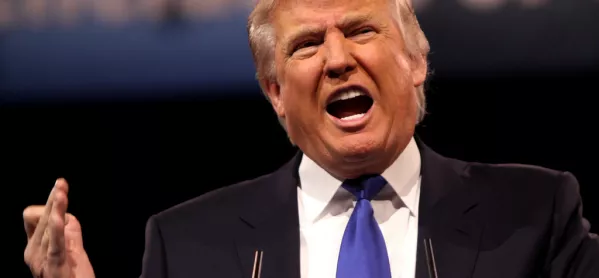Want to keep up with the latest education news and opinion? Follow TES USA on Twitter and like TES USA on Facebook.
Schools must create ‘safe spaces’ for students to discuss the election result so that the issues raised by Donald Trump’s election can be openly discussed and challenged, according to one of American’s leading educationalists.
Teachers should encourage students to examine the claims made by the president-elect and express their own feelings about his victory, said Howard Gardner, professor of cognition and education at Harvard University.
However, it is vital that teachers themselves remain politically neutral in the discussions and are ready to call ‘time-outs’ if things become too heated, he added.
“Not to discuss the election would be like not discussing a hurricane or mudslide when it has occurred outside one’s door,” Professor Gardner said.
“It is important for teachers not to be partisan, and rather to let students be heard, and to encourage them to express their feelings. But also, when they make statements, to provide evidence for what they have said and to be open to civil debate and corrections.
“There may be reasons at a specific time not to discuss the election in class, especially when there are other pressing priorities, but then it is up to the school to create both safe spaces and conditions where claims can be challenged, so long as it is done in a respectful way.”
Professor Gardner said that schools had a wider role to play in promoting the importance of truth as concerns intensify about fake news and ‘post-fact’ campaigns.
With younger children under the age of 10 it is important for teachers to “model truthfulness” at school. “Conducting research together, when there is a factual dispute, can be very enlightening,” he added.
With older students, teachers should talk explicitly about the political system, elections and the ways in which society judges individuals running for office.
“There is no need to be explicit about specific candidates or officials - students with any knowledge will make the linkages - but it is important to let everyone speak up and to point out when someone says something that is not valid, as well as when issues are controversial or unresolved,” said Professor Gardner.
“The teacher needs to be an informed referee or judge, not an advocate of specific persons, parties, or positions.”
Professor Gardner has long promoted the idea that schools should be governed by the ideas of “truth, beauty and goodness” - a point he has argued in books he has written, including The Disciplined Mind and Truth, Beauty and Goodness Reframed: Education for the Virtues in the Era of Truthiness and Twitter.
He said he had been surprised during the presidential campaign by how little importance the electorate placed on whether statements made by candidates were true.
“Time and again, Donald Trump said things that could easily be demonstrated to be false-the so-called “pants on fire” metric. This did not seem to faze his supporters.
While Hillary Clinton’s tally for truth-telling was somewhat better, she was widely and, I believe, correctly perceived as being legalistically truthful but otherwise suspect.”
For more on Howard Gardner’s views on the election result, read The Global Search for Education series on CMRubinWorld. Follow on Twitter @CMRubinWorld




